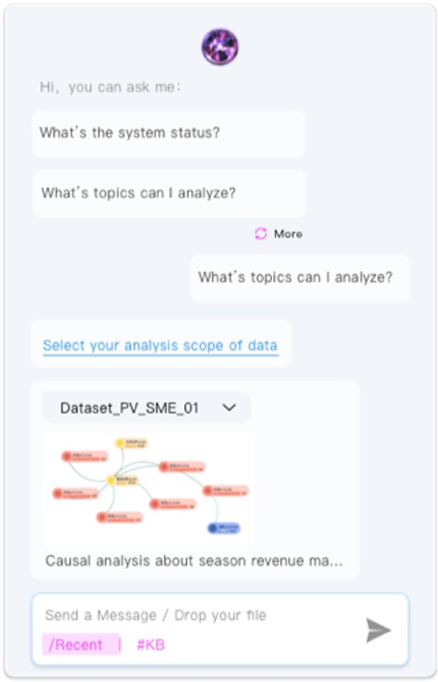
Causal AI Features
-

Causal Discovery
-

Causal Inference
-

Integration with Domain Knowledge
-

Decision-making
Automated Root Cause Inference: Unveiling Cause and Effect with Causal Reasoning
Autonomously detecting anomalies, Ari automates the root cause analysis in aid to decision-making. As shown in the video on the right, upon identifying the 'High condenser approach temperature' fault in an industrial cooling water system, Ari runs causal reasoning in an autonomous manner to pinpoint the root cause in a causal graph discovered with causal machine learning. In seamless integration with LLMs, conclusions of the root cause reasoning can be generated in a conversational agent which responds to queries with relevant and accurate answers.
Automatically Establish Cause and Effect with Machine Learning
R&B's causal engine integrated with LLMs is capable of performing autonomous causal discovery across various structured and unstructured datasets. With a reasonable amount of effort in preprocessing structured data, the engine will automatically uncover causal relationships between variables using a hybrid approach of unsupervised and supervised machine learning methods. A causal graph will be generated to represent the distinct variables (or datasets) and the inferred causal connections with quantitative measurement on causality. An alternative to establish causal relationships especially in a domain is to leverage the ability of LLMs to discover causality in a qualitative manner.
Causal inference.
When the causal discovery is completed the engine will start executing causal inference in which causal factors are investigated to decide how they influence, in another word, cause specific outcomes with quantitative measurements.

The AI That Can Think
Empowered with LLM - Conversion to Knowledge

Knowledge Conversion
LLMs play a pivotal role in facilitating safe conversion of various data or information sources to private knowledge base which is customizable by enterprises.
Defining Business Goals
LLMs greatly help business users define goals to analyze and establish analysis metrics in accordance to conditions and constraints in the real world.
Organizational Efficiency
Working 24/7, LLMs significantly improve the organizational efficiency in an iterative way when decision-making context is generated and delivered to different levels within the organization.
Enterprise-Grade Agent Platform
Autonomous Planning and In-Depth Analysis, Unleashing the Value of Enterprise Data
Leveraging a powerful component library and autonomous task planning capabilities, our enterprise-grade agents delve deep into data potential, delivering precise and reliable analysis and decision-making support for businesses.
Massive Data Processing, Breaking Through Traditional Limitations
Supports the ingestion and processing of structured, unstructured data, and multiple file types with no data volume limits. It overcomes the computational cost and subjectivity constraints of large language models, providing more objective and efficient data analysis capabilities, offering solid support for both qualitative and quantitative analysis.
Flexible Architecture, Secure and Controllable
Supports hot-swappable mainstream large language models, with agents deployable on-premise to accommodate both cloud collaboration and private deployment needs. The system architecture meets enterprise-grade security and reliability requirements, ensuring end-to-end controllability and trustworthiness of business data.
Data Service Capability
Ari’s data agents helps any users build a solid data foundation prior to any sophisticated modeling and applications. Ari’s data agents processes both structured and structured data in delivery of services from data quality, cleaning, query, insights, and integration across various data sources.

Enterprise-Grade Platform Toolkits
End-to-End Data Engineering Coverage, Building a Smart Data Foundation
ETL Tools
Provide robust capabilities for raw data ingestion, management, and monitoring, supporting multiple industrial-standard protocols and enabling real-time millisecond-level time-series data access, ensuring efficient and stable data flow.
Algorithm Developer Tools
Offer flexible and scalable algorithm orchestration and configuration capabilities, supporting custom analysis workflows and machine learning model integration, empowering businesses to rapidly build intelligent business scenarios.
Data Modeling Tools
Easily handle complex data environments, supporting various modeling methods such as thing models and business models. They clearly construct data relationships and uncover deep business logic, providing a consistent and clear data view for analysis and application.
Visualization Tools
Support multi-dimensional reports, interactive dashboards, and digital twin visualizations, helping enterprises intuitively grasp business status and trends, enabling precise data-driven decision-making.









